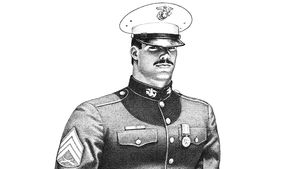When Vivek Tiwary
and his wife, Tracy, exchanged vows on June 11 in
Manhattan's TriBeCa neighborhood, they toasted guests
with a plea on behalf of gay and lesbian couples.
"The fact that Tracy and I found each other and
were able to nurture our relationship to the point of
marriage truly is a blessing," Vivek told his
friends and family. "But we feel that the
ability to honor that relationship by getting married is a
right."
Marriage equality
had always been important to the couple, but the 2004
election--when 11 states passed constitutional
amendments banning legal marriage for gay and lesbian
couples--shocked Vivek. The New Yorker is of
Indian and Guyanese descent, and Tracy is half Irish and
half Italian. The recent blows against gay and lesbian
couples conjured an unpleasant reminder of the days
when differing skin colors barred couples from
marriage.
"I was
like, 'Wow, I really need to get off my ass and do
something like I've been saying I was going
to.' If the government can't tell you who
you should love, how can they tell you who you should
marry?" Tiwary asks. "I couldn't
help but feel a little uncomfortable having such a
wonderful experience with my wife and knowing that there
were close friends of ours who were sharing that
experience and who, at least in the near term,
aren't allowed to have that experience
themselves."
During the past
year, the New York City-based Freedom to Marry
group--which fights for the right of gay and lesbian
couples to be legally married--has been fielding
a steady stream of inquiries from straight couples
wanting to know how they can take a stand.
They want to
dedicate their own weddings--that one special day they
will ideally cherish for years to come--to the
endorsement of marriage equality for gay and lesbian
couples. "People are coming to understand that it
matters, and that it matters to them," says Evan
Wolfson, executive director of Freedom to Marry.
When financial
services marketer Cynthia Kopec and health care marketing
expert Steve Berley were married in Piedmont, Calif., in
May, they asked their guests to make a donation to
Freedom to Marry.
"It was so
much fun to think about having all the people that you love
in one place at one time to celebrate your
union," Cynthia recalls. "And the only
thing that was making me sad was thinking of all the people
who were coming to the wedding who didn't have
the same right to do exactly what we were
doing."
Both Kopec and
Berley were in their late 30s and "didn't need
pots and pans and china," Cynthia says.
Instead, they needed a way of fulfilling the
traditional wedding "mitzvah" of
"tikkun olam," or the commandment to
"repair the world through good deeds." The
mission was not just about gay men and lesbians.
"It's for all of us," Cynthia says.
"No civil
rights movement has ever been won solely by the people who
bear the direct brunt of the discrimination,"
says Wolfson. "In America the way social change
happens is when it crosses over to the broader public,
not necessarily the majority, but the broader public of
fair-minded people whose hearts and minds are open and
who begin to take action and speak out against
injustice."
Wolfson points
out the fact that most white Americans would have taken a
stand for civil rights had they been old enough to do so in
the 1950s and '60s.
Likewise,
ordinary people who have given gay men and lesbians their
silent support in the past see the national hostility
unleashed by Christian conservatives empowered by the
George W. Bush administration and are stirred to
action. The demonization of gays, solidified by the 14
antigay constitutional amendments passed since August 2004,
has not just been an effort to stop same-sex marriage,
Wolfson says. It has also been an effort to send a
drumbeat of rejection throughout the polity.
"They're trying to send the idea out to the
public that the public has thought about marriage
equality for gay people and rejected it. And therefore
fair-minded people need not wake up. Politicians need not
rise," Wolfson says.
That a growing
number of Americans support some kind of legal protections
for gay and lesbian couples--though civil unions
confer only a fraction of the benefits of
marriage--indicates increasing acceptance of the idea
that same-sex couples are families, with all the
complexities and joys that accompany love and
commitment, marriage experts say.
In an August 3
Pew Research poll, Americans' support for same-sex
marriage rebounded to its July 2003 level: 36%. Meanwhile,
53% of those surveyed backed some kind of legal union
for same-sex couples.
New Yorkers Ann
Beirne and David Freiman have just begun to plan their
wedding, set for next summer or fall. And as a matter of
principle, despite the inconvenience for many of their
guests, they will hold the ceremony in Massachusetts,
contributing their taxes to the only state in the
country that allows same-sex marriage. And yes, it's
going to be a large affair. Ann's father is the
youngest of six brothers, all of whom have kids, and
everyone's close. "In my family, weddings get
kind of big," she says.


















































































